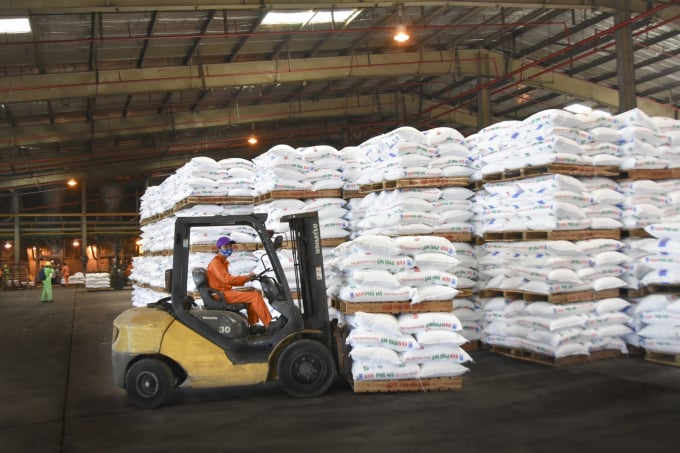June 1, 2025 | 03:57 GMT +7
June 1, 2025 | 03:57 GMT +7
Hotline: 0913.378.918
June 1, 2025 | 03:57 GMT +7
Hotline: 0913.378.918

Financial experts from the Vietnam Fertilizer Association (FAV) have issued three scenarios for the country’s fertilizer industry after the Ministry of Finance proposed value-added tax (VAT) of five per cent on fertilizer recently.
Under the proposal, the VAT rate of five per cent is suggested for fertilizer products which are now free of VAT.
Experts have said that the biggest effect of this tax adjustment is to return the fairness to domestic fertilizers with imported fertilizers, increasing the competitiveness of "Made in Vietnam" fertilizers, and encouraging Vietnamese to use Vietnamese products.
In the firsts scenario, the selling price of fertilizer products will not increase as the input VAT is not deducted. However, domestic enterprises have to reduce revenue due to the output VAT of five per cent. Thereby, their pre-tax profit may increase but not significantly.
Enterprises will be fully deducted the input VAT on new investment projects of fertilizer production without having to record an increase in asset value. This is a very good point to encourage investment, especially in new technology fertilizers, which need high investment capital.
It is estimated that all fertilizer companies will see a decrease in total revenue of more than VNĐ3 trillion, however, their pre-profit tax will not change much.
In the second scenario, the selling price of fertilizer products decreases because the enterprises reduce costs for production. This is the case in which people benefit the most.
In the last scenario, the selling price of fertilizer products will raise corresponding to the increase in output VAT. However, the selling price is decided by the market, which is currently very competitive.
Insiders have said that Vietnam has fully acceded to international treaties, in which the fertilizer import tax rate is mostly zero per cent, making the imported fertilizer prices cheap. Therefore, an increase in fertilizer prices is unlikely occurred, or if any, it will be in a very short term.
As the law is not yet amended, the imported fertilizers are seen to be a competitive advantage in comparison with the domestically-producer fertilizers because of cheap raw materials. The import tax is almost zero so the selling price is always lower than that of domestic fertilizers, making domestic production stagnant and not developed.
According to statistics of the General Department of Customs, the amount of imported fertilizers increased from 3.7 million tonnes in 2014 to more than 5.6 million tonnes in 2017, up nearly two million tonnes.
At the same time, businesses are not encouraged to invest in innovation in technology and equipment because the VAT for the investment is not refundable or deductible.
Under the direction of Standing Deputy Prime Minister Trương Hoa Binh, the law amendment will ensure the principle “not increasing input costs for farmers”, which means the fertilizer selling price after the amended law will not increase.
Experts have said that the first scenario will be the most advantageous one, in which farmers across the country will benefit in the long term, with lower fertilizer prices and reduced input costs, improving the efficiency in agricultural production and significantly increasing income for the whole agriculture sector.
Author: Nguyen Huan. Translated by To Nhu. Edited by Duc Huy.
/2025/05/29/5625-12-214801_567.jpg)
(VAN) Provincial mergers in the Mekong Delta promise to streamline administration, expand inter-provincial raw material areas, and foster close linkages in agricultural value chains, benefiting both businesses and cooperatives.

(VAN) Merging Mekong Delta provinces contributes to the expansion of agricultural raw material areas, addressing previous constraints caused by provincial boundaries. Additionally, this expansion will reduce costs and strengthen linkages between businesses, cooperatives, and farmers.
/2025/05/29/1043-2-153730_145.jpg)
(VAN) The Government's policy to merge provincial-level administrative units opens up major opportunities for the Mekong Delta region to reshape its agricultural development strategy toward large-scale production, effective regional linkages, and sustainability.

(VAN) The mutual export of agrifood products between the European Union (EU) and the United Kingdom (UK) must occur again without certification, border controls or other red tape. This was agreed at the UK-EU summit.
/2025/05/22/5121-2-173645_677.jpg)
(VAN) NBSAP Tracker identifies strengths and areas for improvement in the National Biodiversity Strategy, based on each region’s priorities and capacities.

(VAN) The draft amendment to the Circular on rice export trading stipulates a periodic reporting regime for rice exporting enterprises.

(VAN) Dong Thap farmers attained an average profit margin of 64% during the summer-autumn 2024 crop (first season), while An Giang and Kien Giang farmers followed with 56% and 54%, respectively.